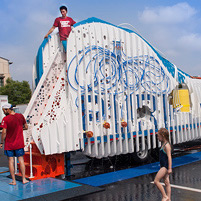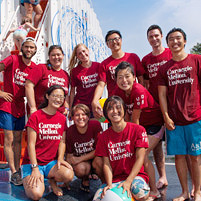PURIFLUME


UDBS student PURIFLUME collaborators
A new student project at Carnegie Mellon University offers filtered fun for city neighborhoods.
Reminiscent of a giant dinosaur skeleton painted bright orange and blue, the PURIFLUME mobile water system features elements commonly found in a municipal spray park, such as a water slide and jet sprays.
It offers children and parents (and others) with a way to cool off during the summer heat — while they learn about water conservation in an entertaining way.
The project was designed and built by a group of CMU students under the direction of Professor John Folan in the Urban Design Build Studio (UDBS) at Carnegie Mellon's School of Architecture. CMU's UDBS used advanced digital simulation, representation and fabrication technologies to bring the project to life.
"I'm extremely proud of what the students have accomplished," Folan said. "It has demanded an incredible level of dedication and commitment from them, and the reward of seeing Pittsburgh's communities potentially benefiting from the project has been their primary motivation."
The PURIFLUME concept won Ford's Ford College Community Challenge (Ford C3), a national challenge grant competition that recognizes colleges and universities that utilize a school's resources and capacity to address an urgent, unmet social need or problem in the local community.
The water structure should provide welcome relief to residents of many of Pittsburgh's neighborhoods by offering a sustainable alternative to pools that can be resource intensive to maintain.
Nicknamed the "Eco-Beastie," the huge neon-colored unit is a mobile closed-loop water filtration system. Explanations of how the system works are posted on the unit and its creators hope users will absorb the information while having fun.
Working in collaboration with the Leslie Park Pool Collective in Pittsburgh, CMU's UDBS developed a sustainable spray park proposal for the decommissioned Leslie Park Pool that would use environmentally friendly spray park equipment and Pennsylvania's first closed-loop passive water filtration system.
As a result, funding and local support emerged to create a mobile prototype of the proposed sustainable water filtration system.
Ford C3 requires colleges to create project proposals with significant student input, involvement and leadership from beginning to end, said Mike Schmidt, director of Education and Community Development at Ford.
Ford C3 proposals must address the theme of the Challenge — Building Sustainable Communities — in some unique and innovative way. Up to five Ford C3 awards are made each year.
"Winning proposals have a distinctive student perspective on what it means to have a sustainable community," Schmidt said. "Each year, we select five winning proposals to receive this one-time award. The CMU proposal stood out because of its innovative approach to educating the public about issues involving sustainability and water."
Related Links: Read the press release | CMU's Urban Design Build Studio | School of Architecture
